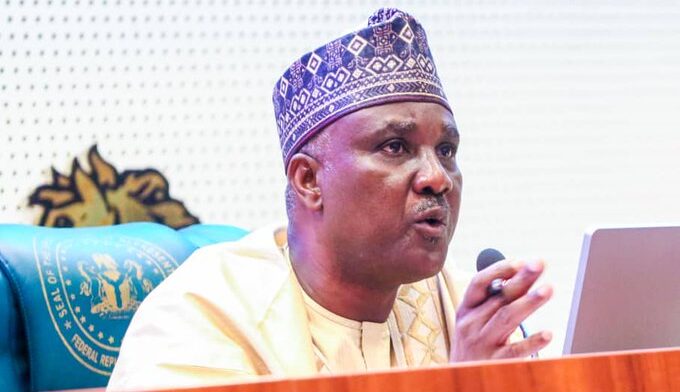THE Speaker of the House of Representatives, Rt. Hon. Abbas Tajudeen, has declared that the lower chamber of the National Assembly fully supports President Bola Ahmed Tinubu’s borrowing strategy, describing it as a “strategic and responsible fiscal tool” crucial to Nigeria’s economic recovery and growth.
News Point Nigeria reports that speaking at the 8th Annual African Network of Parliamentary Budget Offices (AN-PBO) Conference hosted by the Nigerian National Assembly and the National Assembly Budget and Research Office (NABRO) in Abuja, Abbas stressed that responsible borrowing is necessary to finance critical infrastructure, stimulate growth, and lift millions out of poverty.
Abbas used the platform to clarify recent reports suggesting that the House had raised alarm over Nigeria’s rising debt profile and was opposed to further borrowing.
“Recently, a speech delivered by the House Leader at the West Africa Parliamentary Conference was horrendously and mischievously reported out of context, creating the false impression that the House of Representatives does not support the borrowing strategy of President Tinubu’s administration,” he said.
He insisted that the legislature had never opposed borrowing but had consistently advocated for transparency, sustainability, and targeting of borrowed funds towards productive sectors.
According to the Speaker, all loans under President Tinubu’s administration are designed to be channeled into transformative, revenue-generating projects in power, transport, and agriculture not recurrent expenditure or consumption.
“Like every modern economy, Nigeria must sometimes leverage credit to finance critical infrastructure, stimulate growth, and protect vulnerable populations,” Abbas said.
“Under our President’s leadership, borrowed funds are being channeled towards transformative projects that will expand revenue-generating capacity rather than for consumption.”
While acknowledging that Nigeria’s debt-to-GDP ratio has risen to 52 percent above the 40 percent statutory limit, Abbas said this underscores the importance of parliamentary oversight and fiscal discipline, not a rejection of borrowing entirely.
He further disclosed that Nigeria loses about $18 billion annually to financial crimes, amounting to roughly 3.8 percent of GDP, warning that such leakages undermine development efforts.
Abbas also broadened the discussion to Africa’s overall development challenges, noting that the continent loses $587 billion annually to corruption, illicit financial flows, and inefficiencies.
“Africa is at a crucial crossroads in its history. With a population of 1.4 billion, one-sixth of humanity, we have bold ambitions captured in the African Union Agenda 2063. But poverty remains widespread, with 464 million Africans living in extreme poverty as of 2024,” he said.
He warned that youth unemployment poses a demographic risk, with 12 million young Africans entering the labor market annually but only about 3 million formal jobs created.
Chairperson of AN-PBO, Professor Dumisani Jantjies, commended Nigeria’s macroeconomic reforms, noting that economic growth had reached 3.4 percent in 2024, the highest in a decade.
However, he warned that Africa’s economies remain vulnerable to global shocks, volatile capital flows, and climate change impacts, stressing the need for parliamentary budget offices to continue providing credible, non-partisan, evidence-based analysis to guide fiscal policy.
The Speaker concluded by reaffirming that the House will strengthen oversight mechanisms to ensure that every borrowed dollar or naira is invested in projects that expand Nigeria’s productive capacity, drive inclusive growth, and reduce poverty.
“The House stands firmly behind the President’s vision of using judicious borrowing as a catalyst for growth and poverty reduction,” he declared.







